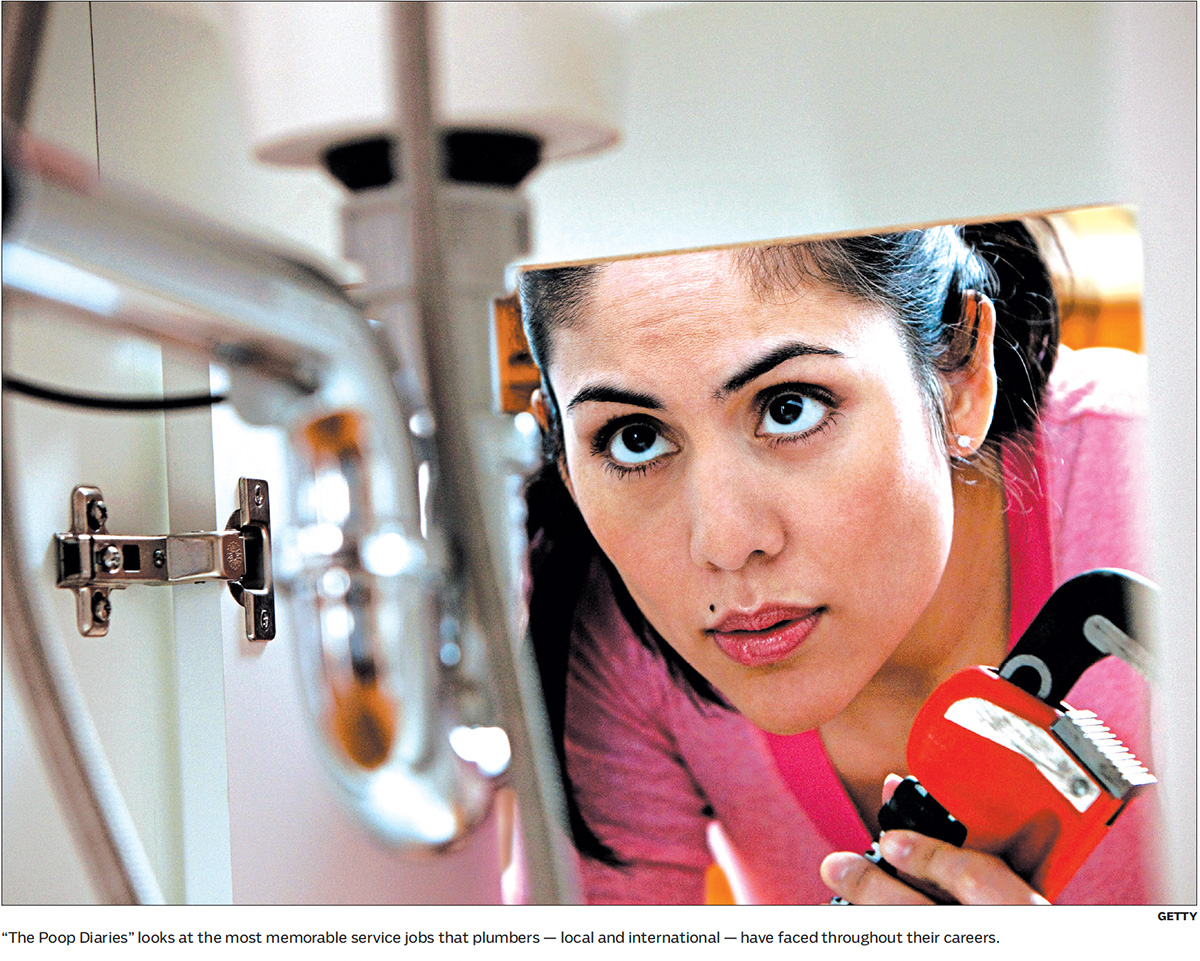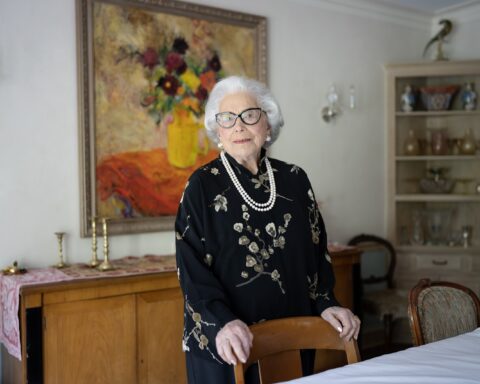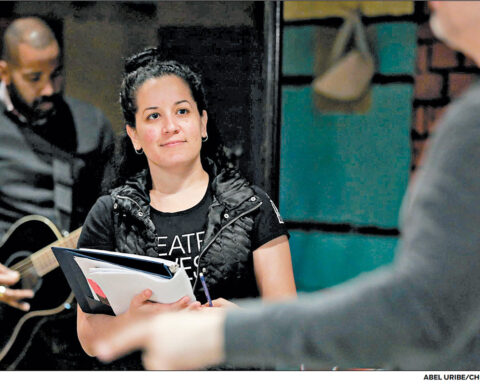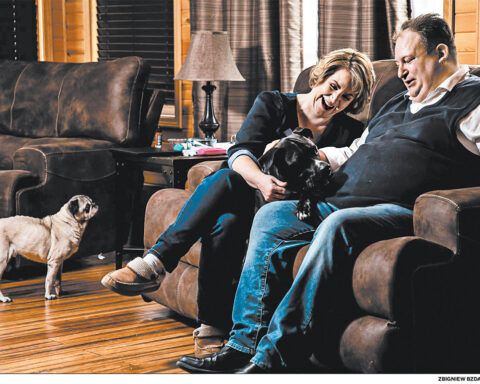Yes, plumbers have encountered fake vaginas, snakes, rats, weapons and drugs while on duty, but according to the plumbers who fill 10 chapters of Abby Ross’ book, “The Poop Diaries,” they wouldn’t trade their jumpsuits for any other career.
Ross, a Chicago resident and Highland Park High School alumna, takes us behind the scenes of plumbers’ service calls, so readers can get a firsthand account of some of the more memorable ones. What unfolds in the 200-plus-page book, released Thursday, are tales that are “disgusting, hilarious, or scary.” But don’t be fooled, as Ross says in her intro, this book is about poop—but so much more.
“At first I pictured the book to be pure humor, but as I interviewed these people, I realized that there was so much more depth to their experiences than just the sex toys and poop,” Ross said. “And that’s really the message that I wanted to send.”
The “more” lies in the details, such as that many folks fell into the trade by happenstance—a neighbor or uncle asks for help on some jobs, or existing careers weren’t challenging or paying enough.
“I never thought about contractors or plumbers, and most people don’t,” Ross said. “It’s so funny because plumbers know so much about us, but we know so little about them.”
It was when Ross met her plumber Jon (Ross only uses first names in the book) on a cold night in Chicago that she got the idea to write about this particular field of contractors.
“My toilet clogged on a Wednesday night,” Ross said. “I called a plumber around 8-9 p.m. Jon came over and fixed the clog within 20 minutes. He obviously knew his stuff. I asked if he could tell me his five greatest hits, his best service calls, and he was so hilarious. I really enjoyed his stories and thought: I want to write a book about you.”

Ross broadened her scope and talked with plumbers who grew up in Green Bay, Wisconsin, who make their home in Edmonton, Canada, and who work in Oakland, California, as well as several local plumbers, including a former president of the local Plumbing Contractors Association (PCA).
Not to give too many spoilers, but the stories from Carissa and Jac, women plumbers, are not to be missed. Carissa was installing a urinal in a bar when a customer approached her for a date. There’s another story about a collection of condoms clogging a toilet, which leads to the client accusing Carissa of being a homewrecker. Jac fixed a restaurant’s toilet pro bono and offered her advice and card to an employee to give to the business’ owner. When asked why the owner didn’t call her, the employee’s response was: “I showed him your card. When he saw you were a woman, he did not believe anything you said.”
 “Their perspective adds so much to the book,” Ross said. “These are the types of things that only a woman could experience. … I think that with the #MeToo movement, women’s rights have come a long way. Unfortunately in plumbing, it’s just not there yet.”
“Their perspective adds so much to the book,” Ross said. “These are the types of things that only a woman could experience. … I think that with the #MeToo movement, women’s rights have come a long way. Unfortunately in plumbing, it’s just not there yet.”
Ross went on to say that that’s unfortunate, given that there is a shortage of plumbers, as mentioned by Democratic presidential candidate Sen. Amy Klobuchar on the campaign trail and numerous trades publications and learning institutions. Ross hopes her book encourages people to go into the trades.
“A lot of people think plumbers are blue-collar workers who have plumber’s cracks and don’t make a lot of money—that is so far from the truth,” Ross said. She adds that many of the plumbers she interviewed have second homes and boats, lives they created after attending a trade school or doing an apprenticeship instead of going to college.
Kelly Castrogiovanni, president and owner of Terry Plumbing, preordered Ross’ book. As a female owner of a plumbing company based in Countryside for almost 10 years, she says people are often shocked when they meet her in person. Many assume she must be male because she owns a plumbing company.
“There’s always people who look at me and think: Why are you here? You don’t fit in. You must be a front for a husband or brother or something like that,” said Castrogiovanni, treasurer of the PCA. “That’s my challenge: to try to prove myself. I feel like I have to prove myself 10 times harder than what a man would.”
Castrogiovanni says becoming a licensed plumber takes five years of learning and training, but once the license is in hand, plumbers will always be able to find a job because they’re always needed. That’s what she’s trying to get across to other women.
“It is a hard sell because there’s a lot of heavy lifting. People think they don’t want to be knee-deep in a sewer line,” she said. “But you get out of school making $100,000 instead of getting out of college owing over $100,000.”
Rachel Macias, 33, of Portage Park, is a plumber’s apprentice at Castrogiovanni’s company. She came in through Chicago Women in Trades, which helps women get into the building trades.
“It was something I wanted to do, but I didn’t really know how to get into it,” she said. “I wanted to have a skill. That was the main reason.”
Macias works primarily in new construction and less on the service (on-call side) and is already making close to $30 an hour—which she says will go as high as $51 per hour when she becomes a journeyman. With two children, ages 14 and 9, she finds the working hours stable and the health care benefits amazing. She’s thankful that she hasn’t had the kind of experiences Jac and Carissa have had while on the job.
She’s looking forward to reading Ross’ book. When asked if a younger version of herself would have chosen plumbing as a profession, she says she’s not sure.
“It’s never been an out-there option for us,” Macias said. “I thought I was going to be a lawyer or something, but if I had known it was possible, then yeah, I would have thought that I could be a plumber. Like my daughter now, she says she wants to be a plumber. I don’t think she is, but it’s motivation.”







